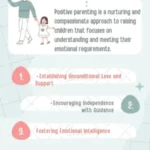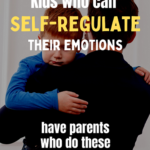Parenting is an art that takes patience, love, and instruction. In today’s fast-paced world, parents seek credible tools to better their parenting abilities and establish healthy connections with their children. This comprehensive guide, “Parenting Class,” is your key to unlocking the secrets of effective parenting, delivering insights, recommendations, and methods to help you raise extraordinary children.
Understanding the Essence of Parenting
Parenting – An Ever-Evolving Journey
Parenting is a lifetime process filled with difficulties and rewards. It’s a continual process of nurturing and leading your kid towards being a responsible, caring, and successful person. While each family’s path is unique, there are basic concepts that may serve as a firm basis for good parenting.
The Importance of Parenting Education
In today’s information era, access to knowledge is at our fingertips. Parenting education is no exception. Attending a parenting class or finding online resources may be a game-changer for parents aiming to offer the best for their children. Let’s go into the important parts of parenting that may be strengthened via a planned parenting class.

The Benefits of Enrolling in a Parenting Class
1. Improved Communication Skills
One of the most critical parts of good parenting is communication. A parenting class offers you with the skills to speak freely, honestly, and empathetically with your kid. You’ll learn how to listen attentively, comprehend your child’s needs, and react intelligently. Effective communication stands as a cornerstone in the realm of good parenting, and a parenting class emerges as a pivotal resource in honing this skill. By enrolling in such programs, parents gain valuable insights and techniques to communicate openly, honestly, and empathetically with their children. These classes impart the art of attentive listening, facilitating a profound understanding of a child’s needs, and equipping parents to respond intelligently to foster a healthy parent-child relationship.
2. Positive Discipline Techniques
Discipline is not about punishing but rather about educating and leading. Parenting workshops provide positive disciplinary approaches that concentrate on imparting essential life skills and creating clear limits without resorting to harsh punishments. Discipline, often misconstrued as punitive measures, takes a transformative turn in parenting workshops. These programs emphasize positive disciplinary approaches that transcend traditional punishment. Instead, the focus lies on education and guidance, imparting essential life skills while setting clear boundaries. Through these techniques, parents learn the delicate balance of instilling discipline without resorting to harsh punishments, fostering an environment conducive to the child’s overall development.
3. Building Stronger Parent-Child Bonds
A parenting program stresses the need of creating strong emotional relationships with your kid. You’ll find how to establish a caring and loving atmosphere where your youngster feels secure and valued. Parenting is not merely a duty but a journey of building robust emotional connections with one’s children. A parenting program accentuates the importance of creating a nurturing and loving atmosphere where a child feels not only secure but also genuinely valued. By delving into these classes, parents gain insights into the dynamics of establishing a bond that transcends the conventional roles, ensuring a foundation of trust and understanding.
4. Stress Management
Parenting may be stressful at times, leading to stress for both parents and children. A parenting class gives skills for controlling stress, guaranteeing a better and happier family environment.
Read also : Positive Parenting Techniques 101: A Comprehensive Guide to Transform Your Effective Parenting Journey
Key Topics Covered in a Parenting Class
1. Effective Communication
- Learn the skill of active listening.
- Understand the power of empathy in talks.
- Develop communication methods for diverse age groups.
2. Child Development
- Gain insights into the many phases of child development.
- Understand the particular requirements of newborns, toddlers, and teenagers.
- Explore age-appropriate activities and instructional materials.
3. Positive Discipline
- Discover non-punitive disciplining approaches.
- Set clear and consistent limits.
- Encourage responsible conduct in your youngster.
4. Nurturing Emotional Intelligence
- Learn to recognize and regulate emotions.
- Foster emotional intelligence in your kid.
- Build a helpful and emotionally sensitive family atmosphere.
5. Stress Management
- Explore stress-relief practices for parents.
- Recognize indicators of stress in your kid and handle them.
- Create a peaceful and low-stress household setting.
Practical Applications of Parenting Class Insights
1. Active Listening
Implement active listening by giving your kid your complete attention when they want to chat. Encourage them to communicate their emotions and opinions without interruption. In the realm of effective parenting, active listening emerges as a fundamental practice. This entails giving your child undivided attention when they seek to communicate. Encourage them to express their emotions and opinions without interruptions, creating a conducive environment for open and honest dialogue. By implementing active listening, you foster a sense of validation and understanding within the parent-child relationship.
2. Positive Reinforcement
Practice positive reinforcement by appreciating your child’s successes and efforts. This develops a feeling of success and drives them to succeed. The power of positive reinforcement plays a pivotal role in nurturing a child’s development. Acknowledge and appreciate your child’s successes and efforts regularly. This not only instills a sense of accomplishment but also serves as a motivational factor, encouraging them to strive for success in various aspects of their lives.
3. Consistent Boundaries
Establish consistent limits and consequences for acts. Make sure your youngster understands the rules and knows what to anticipate. Establishing consistent boundaries and consequences forms the backbone of effective parenting. Clearly define limits and the corresponding outcomes for actions. Ensure that your child comprehends the rules and knows what to expect, fostering a sense of structure and predictability crucial for their overall well-being.
4. Quality Time
Set aside devoted quality time with your youngster. Engage in activities that foster connection and create treasured memories. Devoting quality time to your child is more than a luxury; it’s a necessity for a robust parent-child relationship. Set aside dedicated moments for activities that promote connection and create cherished memories. These shared experiences contribute significantly to building a strong bond and understanding between parent and child.
5. Self-Care
Remember that self-care is crucial for good parenting. Take time for yourself to rejuvenate and be the best parent you can be. Amidst the demands of parenting, self-care emerges as a non-negotiable element. Recognize that taking time for yourself is not a selfish act but a prerequisite for effective parenting. By prioritizing self-care, you rejuvenate your energy and well-being, enabling you to be the best possible parent for your child. Remember, a well-nurtured parent is better equipped to nurture their child effectively.
Conclusion: Nurturing Exceptional Children
In conclusion, parenting is a meaningful adventure that involves ongoing learning and progress. Enrolling in a parenting class gives you with vital skills and expertise to navigate this path effectively. By concentrating on efficient communication, good discipline, emotional intelligence, and stress management, you may foster extraordinary children who flourish in today’s society.
Don’t miss the chance to invest in your child’s future and your personal development as a parent. Enroll in a parenting class now and go on a transforming path towards being the greatest parent you can be.





